- Home
- Herman Melville
Israel Potter: His Fifty Years of Exile (Annotated Edition) Page 4
Israel Potter: His Fifty Years of Exile (Annotated Edition) Read online
Page 4
Hereupon one of the laborers standing by informed the gentleman how it was with Israel, when immediately the knight put a shilling into his hands and bade him go to a little roadside inn, which was nearer than the house, and buy him bread and a pot of beer. Thus refreshed he returned to the band, and toiled with them till four o'clock, when the day's work was over.
Arrived at the house he there again saw his employer, who, after attentively eyeing him without speaking, bade a meal be prepared for him, when the maid presenting a smaller supply than her kind master deemed necessary, she was ordered to return and bring out the entire dish. But aware of the danger of sudden repletion of heavy food to one in his condition, Israel, previously recruited by the frugal meal at the inn, partook but sparingly. The repast was spread on the grass, and being over, the good knight again looking inquisitively at Israel, ordered a comfortable bed to be laid in the barn, and here Israel spent a capital night.
After breakfast, next morning, he was proceeding to go with the laborers to their work, when his employer approaching him with a benevolent air, bade him return to his couch, and there remain till he had slept his fill, and was in a better state to resume his labors.
Upon coming forth again a little after noon, he found Sir John walking alone in the grounds. Upon discovering him, Israel would have retreated, fearing that he might intrude; but beckoning him to advance, the knight, as Israel drew nigh, fixed on him such a penetrating glance, that our poor hero quaked to the core. Neither was his dread of detection relieved by the knight's now calling in a loud voice for one from the house. Israel was just on the point of fleeing, when overhearing the words of the master to the servant who now appeared, all dread departed:
"Bring hither some wine!"
It presently came; by order of the knight the salver was set down on a green bank near by, and the servant retired.
"My poor fellow," said Sir John, now pouring out a glass of wine, and handing it to Israel, "I perceive that you are an American; and, if I am not mistaken, you are an escaped prisoner of war. But no fear-drink the wine."
"Mr. Millet," exclaimed Israel aghast, the untasted wine trembling in his hand, "Mr. Millet, I-"
"Mr. Millet-there it is again. Why don't you say _Sir John_ like the rest?"
"Why, sir-pardon me-but somehow, I can't. I've tried; but I can't. You won't betray me for that?"
"Betray-poor fellow! Hark ye, your history is doubtless a secret which you would not wish to divulge to a stranger; but whatever happens to you, I pledge you my honor I will never betray you."
"God bless you for that, Mr. Millet."
"Come, come; call me by my right name. I am not Mr. Millet. You have said Sir to me; and no doubt you have a thousand times said John to other people. Now can't you couple the two? Try once. Come. Only Sir and then John-Sir John_-that's all."
"John-I can't-Sir, sir! — your pardon. I didn't mean that."
"My good fellow," said the knight looking sharply upon Israel, "tell me, are all your countrymen like you? If so, it's no use fighting them. To that effect, I must write to his Majesty myself. Well, I excuse you from Sir Johnning me. But tell me the truth, are you not a seafaring man, and lately a prisoner of war?"
Israel frankly confessed it, and told his whole story. The knight listened with much interest; and at its conclusion, warned Israel to beware of the soldiers; for owing to the seats of some of the royal family being in the neighborhood, the red-coats abounded hereabout.
"I do not wish unnecessarily to speak against my own countrymen," he added, "I but plainly speak for your good. The soldiers you meet prowling on the roads, are not fair specimens of the army. They are a set of mean, dastardly banditti, who, to obtain their fee, would betray their best friends. Once more, I warn you against them. But enough; follow me now to the house, and as you tell me you have exchanged clothes before now, you can do it again. What say you? I will give you coat and breeches for your rags."
Thus generously supplied with clothes and other comforts by the good knight, and implicitly relying upon the honor of so kind-hearted a man, Israel cheered up, and in the course of two or three weeks had so fattened his flanks, that he was able completely to fill Sir John's old buckskin breeches, which at first had hung but loosely about him.
He was assigned to an occupation which removed him from the other workmen. The strawberry bed was put under his sole charge. And often, of mild, sunny afternoons, the knight, genial and gentle with dinner, would stroll bare-headed to the pleasant strawberry bed, and have nice little confidential chats with Israel; while Israel, charmed by the patriarchal demeanor of this true Abrahamic gentleman, with a smile on his lip, and tears of gratitude in his eyes, offered him, from time to time, the plumpest berries of the bed.
When the strawberry season was over, other parts of the grounds were assigned him. And so six months elapsed, when, at the recommendation of Sir John, Israel procured a good berth in the garden of the Princess Amelia.
So completely now had recent events metamorphosed him in all outward things, that few suspected him of being any other than an Englishman.
Not even the knight's domestics. But in the princess's garden, being obliged to work in company with many other laborers, the war was often a topic of discussion among them. And "the d-d Yankee rebels" were not seldom the object of scurrilous remark. Illy could the exile brook in silence such insults upon the country for which he had bled, and for whose honored sake he was that very instant a sufferer. More than once, his indignation came very nigh getting the better of his prudence. He longed for the war to end, that he might but speak a little bit of his mind.
Now the superintendent of the garden was a harsh, overbearing man. The workmen with tame servility endured his worst affronts. But Israel, bred among mountains, found it impossible to restrain himself when made the undeserved object of pitiless epithets. Ere two months went by, he quitted the service of the princess, and engaged himself to a farmer in a small village not far from Brentford. But hardly had he been here three weeks, when a rumor again got afloat that he was a Yankee prisoner of war. Whence this report arose he could never discover. No sooner did it reach the ears of the soldiers, than they were on the alert. Luckily, Israel was apprised of their intentions in time. But he was hard pushed.
He was hunted after with a perseverance worthy a less ignoble cause. He had many hairbreadth escapes. Most assuredly he would have been captured, had it not been for the secret good offices of a few individuals, who, perhaps, were not unfriendly to the American side of the question, though they durst not avow it.
Tracked one night by the soldiers to the house of one of these friends, in whose garret he was concealed, he was obliged to force the skuttle, and running along the roof, passed to those of adjoining houses to the number of ten or twelve, finally succeeding in making his escape.
CHAPTER V
ISRAEL IN THE LION'S DEN
Harassed day and night, hunted from food and sleep, driven from hole to hole like a fox in the woods, with no chance to earn an hour's wages, he was at last advised by one whose sincerity he could not doubt, to apply, on the good word of Sir John Millet, for a berth as laborer in the King's Gardens at Kew. There, it was said, he would be entirely safe, as no soldier durst approach those premises to molest any soul therein employed. It struck the poor exile as curious, that the very den of the British lion, the private grounds of the British King, should be commended to a refugee as his securest asylum.
His nativity carefully concealed, and being personally introduced to the chief gardener by one who well knew him; armed, too, with a line from Sir John, and recommended by his introducer as uncommonly expert at horticulture; Israel was soon installed as keeper of certain less private plants and walks of the park.
It was here, to one of his near country retreats, that, coming from perplexities of state-leaving far behind him the dingy old bricks of St. James-George the Third was wont to walk up and down beneath the long arbors formed by the interlockings of lof
ty trees.
More than once, raking the gravel, Israel through intervening foliage would catch peeps in some private but parallel walk, of that lonely figure, not more shadowy with overhanging leaves than with the shade of royal meditations.
Unauthorized and abhorrent thoughts will sometimes invade the best human heart. Seeing the monarch unguarded before him; remembering that the war was imputed more to the self-will of the King than to the willingness of parliament or the nation; and calling to mind all his own sufferings growing out of that war, with all the calamities of his country; dim impulses, such as those to which the regicide Ravaillae yielded, would shoot balefully across the soul of the exile. But thrusting Satan behind him, Israel vanquished all such temptations. Nor did these ever more disturb him, after his one chance conversation with the monarch.
As he was one day gravelling a little by-walk, wrapped in thought, the King turning a clump of bushes, suddenly brushed Israel's person.
Immediately Israel touched his hat-but did not remove it-bowed, and was retiring; when something in his air arrested the King's attention.
"You ain't an Englishman, — no Englishman-no, no."
Pale as death, Israel tried to answer something; but knowing not what to say, stood frozen to the ground.
"You are a Yankee-a Yankee," said the King again in his rapid and half-stammering way.
Again Israel assayed to reply, but could not. What could he say? Could he lie to a King?
"Yes, yes, — you are one of that stubborn race, — that very stubborn race.
What brought you here?"
"The fate of war, sir."
"May it please your Majesty," said a low cringing voice, approaching,
"this man is in the walk against orders. There is some mistake, may it please your Majesty. Quit the walk, blockhead," he hissed at Israel.
It was one of the junior gardeners who thus spoke. It seems that Israel had mistaken his directions that morning.
"Slink, you dog," hissed the gardener again to Israel; then aloud to the King, "A mistake of the man, I assure your Majesty."
"Go you away-away with ye, and leave him with me," said the king.
Waiting a moment, till the man was out of hearing, the king again turned upon Israel.
"Were you at Bunker Hill? — that bloody Bunker Hill-eh, eh?"
"Yes, sir."
"Fought like a devil-like a very devil, I suppose?"
"Yes, sir."
"Helped flog-helped flog my soldiers?"
"Yes, sir; but very sorry to do it."
"Eh? — eh?-how's that?"
"I took it to be my sad duty, sir."
"Very much mistaken-very much mistaken, indeed. Why do ye sir me? — eh?
I'm your king-your king."
"Sir," said Israel firmly, but with deep respect, "I have no king."
The king darted his eye incensedly for a moment; but without quailing, Israel, now that all was out, still stood with mute respect before him.
The king, turning suddenly, walked rapidly away from Israel a moment, but presently returning with a less hasty pace, said, "You are rumored to be a spy-a spy, or something of that sort-ain't you? But I know you are not-no, no. You are a runaway prisoner of war, eh? You have sought this place to be safe from pursuit, eh? eh? Is it not so? — eh? eh? eh?"
"Sir, it is."
"Well, ye're an honest rebel-rebel, yes, rebel. Hark ye, hark. Say nothing of this talk to any one. And hark again. So long as you remain here at Kew, I shall see that you are safe-safe."
"God bless your Majesty!"
"Eh?"
"God bless your noble Majesty?"
"Come-come-come," smiled the king in delight, "I thought I could conquer ye-conquer ye."
"Not the king, but the king's kindness, your Majesty."
"Join my army-army."
Sadly looking down, Israel silently shook his head.
"You won't? Well, gravel the walk then-gravel away. Very stubborn race-very stubborn race, indeed-very-very-very."
And still growling, the magnanimous lion departed. How the monarch came by his knowledge of so humble an exile, whether through that swift insight into individual character said to form one of the miraculous qualities transmitted with a crown, or whether some of the rumors prevailing outside of the garden had come to his ear, Israel could never determine. Very probably, though, the latter was the case, inasmuch as some vague shadowy report of Israel not being an Englishman, had, a little previous to his interview with the king, been communicated to several of the inferior gardeners. Without any impeachment of Israel's fealty to his country, it must still be narrated, that from this his familiar audience with George the Third, he went away with very favorable views of that monarch. Israel now thought that it could not be the warm heart of the king, but the cold heads of his lords in council, that persuaded him so tyrannically to persecute America. Yet hitherto the precise contrary of this had been Israel's opinion, agreeably to the popular prejudice throughout New England.
Thus we see what strange and powerful magic resides in a crown, and how subtly that cheap and easy magnanimity, which in private belongs to most kings, may operate on good-natured and unfortunate souls. Indeed, had it not been for the peculiar disinterested fidelity of our adventurer's patriotism, he would have soon sported the red coat; and perhaps under the immediate patronage of his royal friend, been advanced in time to no mean rank in the army of Britain. Nor in that case would we have had to follow him, as at last we shall, through long, long years of obscure and penurious wandering.
Continuing in the service of the king's gardeners at Kew, until a season came when the work of the garden required a less number of laborers, Israel, with several others, was discharged; and the day after, engaged himself for a few months to a farmer in the neighborhood where he had been last employed. But hardly a week had gone by, when the old story of his being a rebel, or a runaway prisoner, or a Yankee, or a spy, began to be revived with added malignity. Like bloodhounds, the soldiers were once more on the track. The houses where he harbored were many times searched; but thanks to the fidelity of a few earnest well-wishers, and to his own unsleeping vigilance and activity, the hunted fox still continued to elude apprehension. To such extremities of harassment, however, did this incessant pursuit subject him, that in a fit of despair he was about to surrender himself, and submit to his fate, when Providence seasonably interposed in his favor.
CHAPTER VI
ISRAEL MAKES THE ACQUAINTANCE OF CERTAIN SECRET FRIENDS OF AMERICA, ONE
OF THEM BEING THE FAMOUS AUTHOR OF THE "DIVERSIONS OF PURLEY," THESE
DESPATCH HIM ON A SLY ERRAND ACROSS THE CHANNEL
At this period, though made the victims indeed of British oppression, yet the colonies were not totally without friends in Britain. It was but natural that when Parliament itself held patriotic and gifted men, who not only recommended conciliatory measures, but likewise denounced the war as monstrous; it was but natural that throughout the nation at large there should be many private individuals cherishing similar sentiments, and some who made no scruple clandestinely to act upon them.
Late one night while hiding in a farmer's granary, Israel saw a man with a lantern approaching. He was about to flee, when the man hailed him in a well-known voice, bidding him have no fear. It was the farmer himself.
He carried a message to Israel from a gentleman of Brentford, to the effect, that the refugee was earnestly requested to repair on the following evening to that gentleman's mansion.
At first, Israel was disposed to surmise that either the farmer was playing him false, or else his honest credulity had been imposed upon by evil-minded persons. At any rate, he regarded the message as a decoy, and for half an hour refused to credit its sincerity. But at length he was induced to think a little better of it. The gentleman giving the invitation was one Squire Woodcock, of Brentford, whose loyalty to the king had been under suspicion; so at least the farmer averred. This latter information was not without its effect
.
At nightfall on the following day, being disguised in strange clothes by the farmer, Israel stole from his retreat, and after a few hours' walk, arrived before the ancient brick house of the Squire; who opening the door in person, and learning who it was that stood there, at once assured Israel in the most solemn manner, that no foul play was intended. So the wanderer suffered himself to enter, and be conducted to a private chamber in the rear of the mansion, where were seated two other gentlemen, attired, in the manner of that age, in long laced coats, with small-clothes, and shoes with silver buckles.
"I am John Woodcock," said the host, "and these gentlemen are Horne Tooke and James Bridges. All three of us are friends to America. We have heard of you for some weeks past, and inferring from your conduct, that you must be a Yankee of the true blue stamp, we have resolved to employ you in a way which you cannot but gladly approve; for surely, though an exile, you are still willing to serve your country; if not as a sailor or soldier, yet as a traveller?"
"Tell me how I may do it?" demanded Israel, not completely at ease.
"At that in good time," smiled the Squire. "The point is now-do you repose confidence in my statements?"
Israel glanced inquiringly upon the Squire; then upon his companions; and meeting the expressive, enthusiastic, candid countenance of Horne Tooke-then in the first honest ardor of his political career-turned to the Squire, and said, "Sir, I believe what you have said. Tell me now what I am to do."
"Oh, there is just nothing to be done to-night," said the Squire; "nor for some days to come perhaps, but we wanted to have you prepared."
And hereupon he hinted to his guest rather vaguely of his general intention; and that over, begged him to entertain them with some account of his adventures since he first took up arms for his country. To this Israel had no objections in the world, since all men love to tell the tale of hardships endured in a righteous cause. But ere beginning his story, the Squire refreshed him with some cold beef, laid in a snowy napkin, and a glass of Perry, and thrice during the narration of the adventures, pressed him with additional draughts.

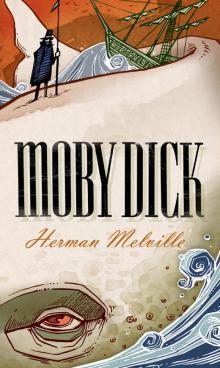 Moby Dick; Or, The Whale
Moby Dick; Or, The Whale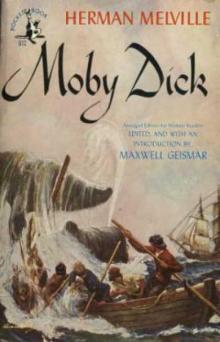 Moby Dick
Moby Dick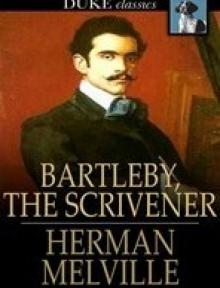 Benito Cereno and Bartleby the Scrivener
Benito Cereno and Bartleby the Scrivener Israel Potter: His Fifty Years of Exile (Annotated Edition)
Israel Potter: His Fifty Years of Exile (Annotated Edition) Billy Budd and the Piazza Tales
Billy Budd and the Piazza Tales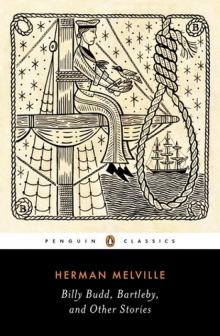 Billy Budd, Bartleby, and Other Stories
Billy Budd, Bartleby, and Other Stories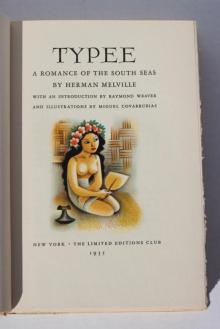 Typee: A Romance of the South Seas
Typee: A Romance of the South Seas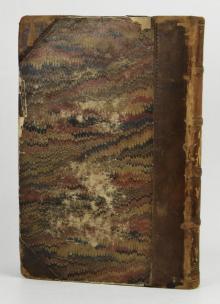 Omoo: Adventures in the South Seas
Omoo: Adventures in the South Seas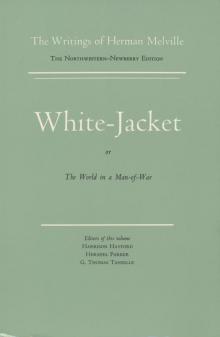 White Jacket; Or, The World on a Man-of-War
White Jacket; Or, The World on a Man-of-War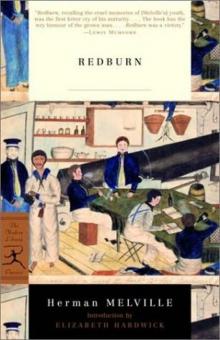 Redburn. His First Voyage
Redburn. His First Voyage Mardi: and A Voyage Thither, Vol. II
Mardi: and A Voyage Thither, Vol. II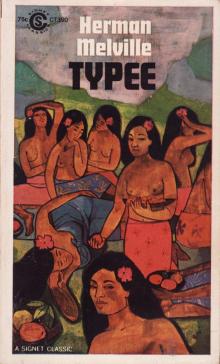 Typee
Typee The Paradise of Bachelors and the Tartarus of Maids
The Paradise of Bachelors and the Tartarus of Maids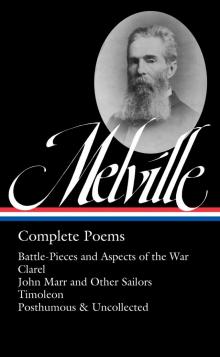 Herman Melville- Complete Poems
Herman Melville- Complete Poems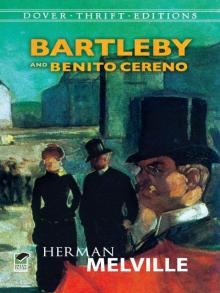 Bartleby and Benito Cereno
Bartleby and Benito Cereno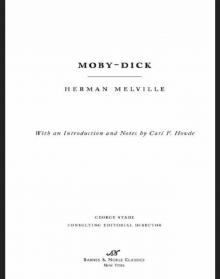 Moby-Dick (Barnes & Noble Classics Series)
Moby-Dick (Barnes & Noble Classics Series)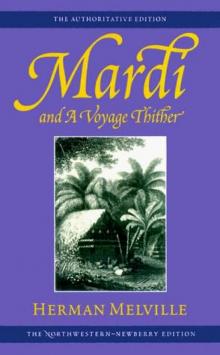 Mardi and a Voyage Thither
Mardi and a Voyage Thither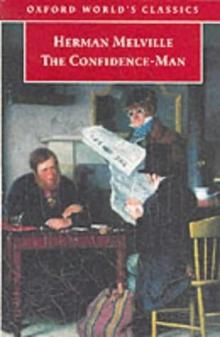 The Confidence-Man
The Confidence-Man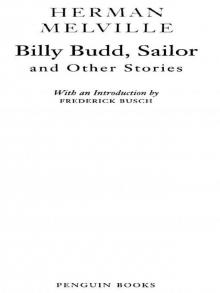 Billy Budd and Other Stories
Billy Budd and Other Stories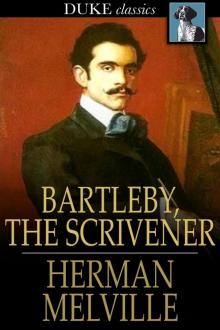 Bartleby the Scrivener
Bartleby the Scrivener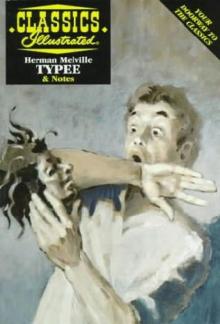 Typee: A Romance of the South Sea
Typee: A Romance of the South Sea I and My Chimney
I and My Chimney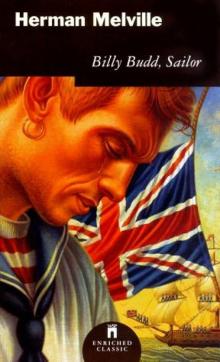 Billy Budd
Billy Budd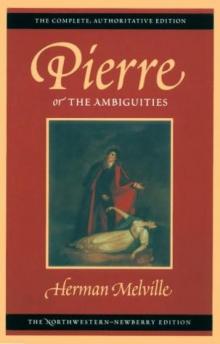 Pierre, Or the Ambiguities
Pierre, Or the Ambiguities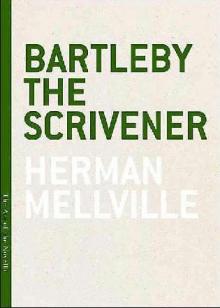 Bartleby, The Scrivener A Story of Wall-Street
Bartleby, The Scrivener A Story of Wall-Street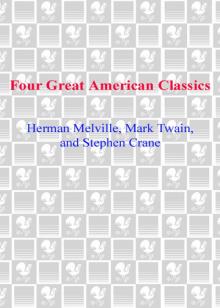 Four Great American Classics
Four Great American Classics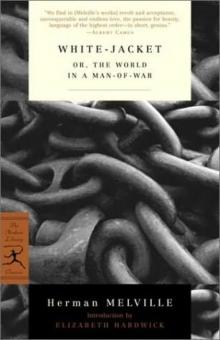 White Jacket or, The World on a Man-of-War
White Jacket or, The World on a Man-of-War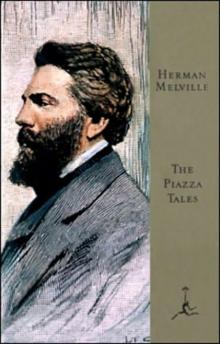 The Piazza Tales
The Piazza Tales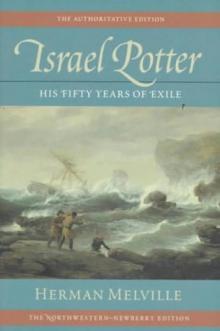 Israel Potter. Fifty Years of Exile
Israel Potter. Fifty Years of Exile